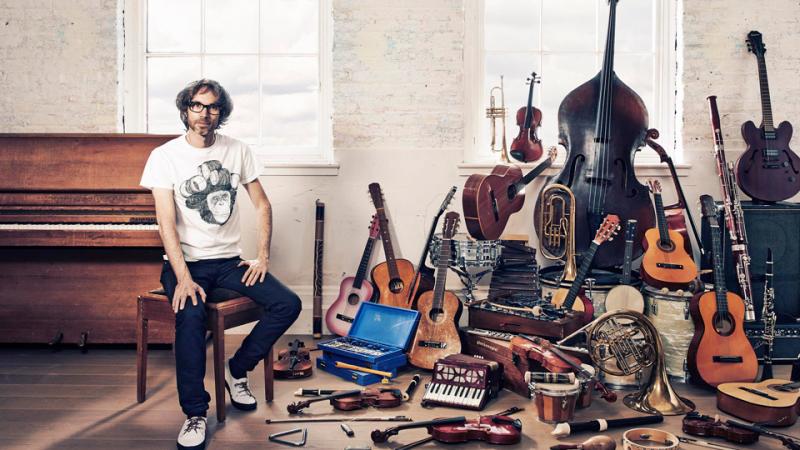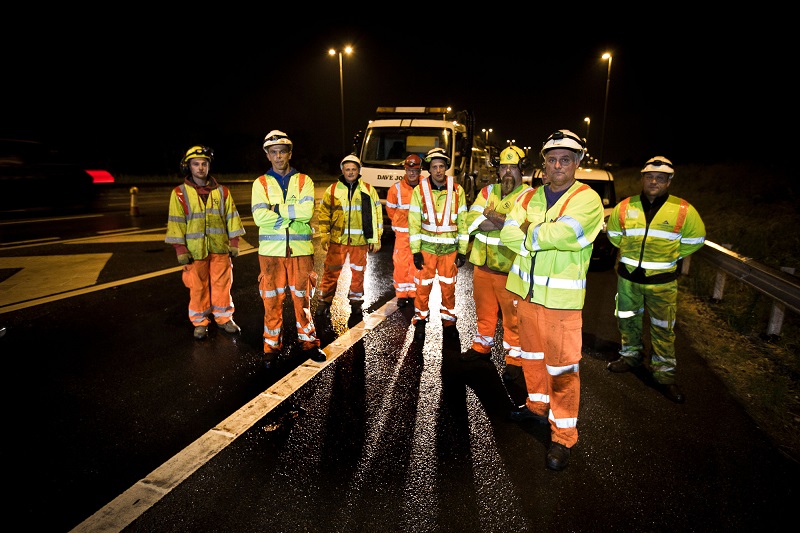Don't Stop the Music, C4 / The Motorway: Life in the Fast Lane, BBC Two | reviews, news & interviews
Don't Stop the Music, C4 / The Motorway: Life in the Fast Lane, BBC Two
Don't Stop the Music, C4 / The Motorway: Life in the Fast Lane, BBC Two
James Rhodes gets music education moving. The M6 remains at a standstill

The act of learning music, in a choir or an orchestra, rounds out a young person. What are the benefits again? All together now: improved social skills, concentration, discipline, self-esteem, numeracy, behaviour, confidence. Music makes you better. Society at large would benefit from investing in music education. It sort of beggars belief that this argument still has to be made.
You can’t get a decent music lesson in every British primary school, not if St Teresa’s in Basildon is anything to go by. Pianist James Rhodes sat in the office of the head teacher who looked him in the eye and told him that the annual budget allocated to music is precisely £0.00. In the year 5 class the teacher, as by statutory requirement, was teaching her pupils rhythm. “That’s not what I would call a music lesson,” said a shellshocked Rhodes.
This isn’t quite what the PM had in mind for the long-lost Big Society
Don’t Stop the Music (****) is an excellent title for a promising idea filtered through the usual formatting sieve of the can-do documentary challenge. Expert parachutes in to help kids learn a vital life skill. For Jamie Oliver, read James Rhodes, a beanpole with big specs and bigger hair. The first episode was as predictable as a three-chord song. Rhodes wandered into a cultural desert and, having cleared a conventional array of obstacles (head teacher obsessing about targets, kids distracted by Sky and PlayStation), by the end of an hour had sprinkled it with the waters of harmony and rhythm. The children were introduced to and enthused by proper music-making, given various wind instruments and two weeks later had accompanied Rhodes in a short concert. Encore!
The one tweak to the format is that this programme is also by way of an appeal. Instruments don’t grow on trees, and nor does money to teach pupils to play them. Rhodes pounded the streets of Basildon imploring people to raid their attics and cellars for discarded instruments, and he wants us all to do the same. This isn’t quite what the PM had in mind for the long-lost Big Society, but if the government won’t support music education, it looks like everyone else will have to. I’m holding onto mine, but as part of the so-called musical amnesty you can gift yours here.
 The M6 is hell on stilts. That much seems clear from The Motorway: Life in the Fast Lane (***). The bit that flies over Birmingham is the subject of an observational documentary which is similar in almost every way to Watermen: A Dirty Business. Blokes in high vis jackets spout homespun wisdom while doing a dirty job out in the field.
The M6 is hell on stilts. That much seems clear from The Motorway: Life in the Fast Lane (***). The bit that flies over Birmingham is the subject of an observational documentary which is similar in almost every way to Watermen: A Dirty Business. Blokes in high vis jackets spout homespun wisdom while doing a dirty job out in the field.
The joke is the programme is a misnomer. In the rush hour, which is more like three hours, there is no fast lane. There are three slow lanes. Sometimes four, now that the hard shoulder is being deployed to ease congestion. Only BMWs cruise the £900m M6 toll road.
It was lovely meeting the tarmackers who go out at night and fix things. It’s an antisocial, dangerous job, but they smiled for the cameras. The roadside rubbish collector we met was an eye-opener. He picks up 30 bottles of lorry driver piss per shift. “Either we haven’t got enough services,” he mused, “or they’ve got a fetish for peeing in bottles.” Lorry drivers get up to all sorts. A highways inspector caught one from Eastern Europe watching a Seventies TV drama on his laptop while driving. The driver, alas, wasn’t one of those people issued with a dashboard cam by the programme-makers.
As is always the way with such series, this was about people, all sorts of them. And there are enough of them - workers, controllers, motorists with dashboard cams, all with thick Brummie accents - to make this a well-spent hour. Spare a thought for those who woke up in 1972 to find a motorway fying past their bedroom window. But anyone who moved in subsequently, the noise would presumably have come up in the survey. They spend their lives complaining. “If you live next to a motorway,” philosophised the man from the Highways Agency, “you’ve got to expect some inconvenience.”
Subscribe to theartsdesk.com
Thank you for continuing to read our work on theartsdesk.com. For unlimited access to every article in its entirety, including our archive of more than 15,000 pieces, we're asking for £5 per month or £40 per year. We feel it's a very good deal, and hope you do too.
To take a subscription now simply click here.
And if you're looking for that extra gift for a friend or family member, why not treat them to a theartsdesk.com gift subscription?
more TV
 Road Diary: Bruce Springsteen and the E Street Band review, Disney+ review - the Boss grows older defiantly
Thom Zimny's film reels in 50 years of New Jersey's most famous export
Road Diary: Bruce Springsteen and the E Street Band review, Disney+ review - the Boss grows older defiantly
Thom Zimny's film reels in 50 years of New Jersey's most famous export
 Industry, BBC One review - bold, addictive saga about corporate culture now
Third season of the tale of investment bankers reaches a satisfying climax
Industry, BBC One review - bold, addictive saga about corporate culture now
Third season of the tale of investment bankers reaches a satisfying climax
 Rivals, Disney+ review - adultery, skulduggery and political incorrectness
Back to the Eighties with Jilly Cooper's tales of the rich and infamous
Rivals, Disney+ review - adultery, skulduggery and political incorrectness
Back to the Eighties with Jilly Cooper's tales of the rich and infamous
 Disclaimer, Apple TV+ review - a misfiring revenge saga from Alfonso Cuarón
Odd casting and weak scripting aren't a temptation to keep watching
Disclaimer, Apple TV+ review - a misfiring revenge saga from Alfonso Cuarón
Odd casting and weak scripting aren't a temptation to keep watching
 Ludwig, BBC One review - entertaining spin on the brainy detective formula
David Mitchell is a perfect fit for this super-sleuth
Ludwig, BBC One review - entertaining spin on the brainy detective formula
David Mitchell is a perfect fit for this super-sleuth
 The Hardacres, Channel 5 review - a fishy tale of upward mobility
Will everyday saga of Yorkshire folk strike a popular note?
The Hardacres, Channel 5 review - a fishy tale of upward mobility
Will everyday saga of Yorkshire folk strike a popular note?
 Joan, ITV1 review - the roller-coaster career of a 1980s jewel thief
Brilliant performance by Sophie Turner as 'The Godmother'
Joan, ITV1 review - the roller-coaster career of a 1980s jewel thief
Brilliant performance by Sophie Turner as 'The Godmother'
 The Penguin, Sky Atlantic review - power, corruption, lies and prosthetics
Colin Farrell makes a beast of himself in Batman spin-off
The Penguin, Sky Atlantic review - power, corruption, lies and prosthetics
Colin Farrell makes a beast of himself in Batman spin-off
 A Very Royal Scandal, Prime Video review - a fairly sound reimagining, but to what end?
The acting is first-rate, but it has no satisfying dramatic goal
A Very Royal Scandal, Prime Video review - a fairly sound reimagining, but to what end?
The acting is first-rate, but it has no satisfying dramatic goal
 Nightsleeper, BBC One review - strangers on a runaway train
Six-part thriller goes off the rails
Nightsleeper, BBC One review - strangers on a runaway train
Six-part thriller goes off the rails
 The Perfect Couple, Netflix review - an inconvenient death ruins lavish Nantucket wedding
Liev Schreiber steals the show in adaptation of Elin Hilderbrand's novel
The Perfect Couple, Netflix review - an inconvenient death ruins lavish Nantucket wedding
Liev Schreiber steals the show in adaptation of Elin Hilderbrand's novel
 Sambre: Anatomy of a Crime, BBC Four review - satisfying novelistic retelling of a French true crime saga
Compelling story of a rapist who hid in plain sight for 30 years
Sambre: Anatomy of a Crime, BBC Four review - satisfying novelistic retelling of a French true crime saga
Compelling story of a rapist who hid in plain sight for 30 years

Add comment